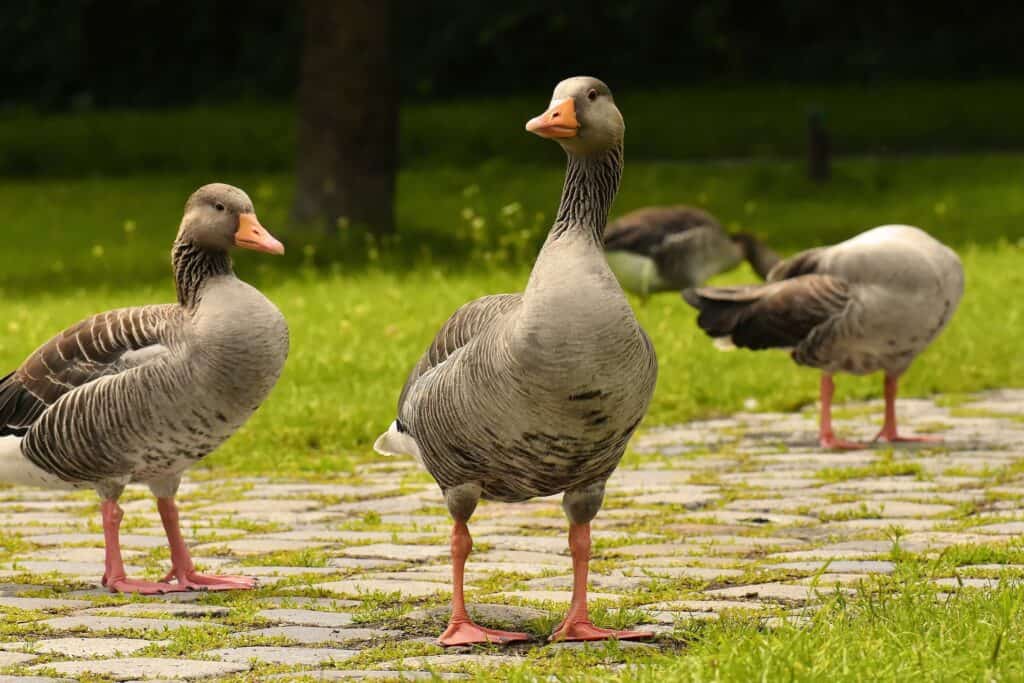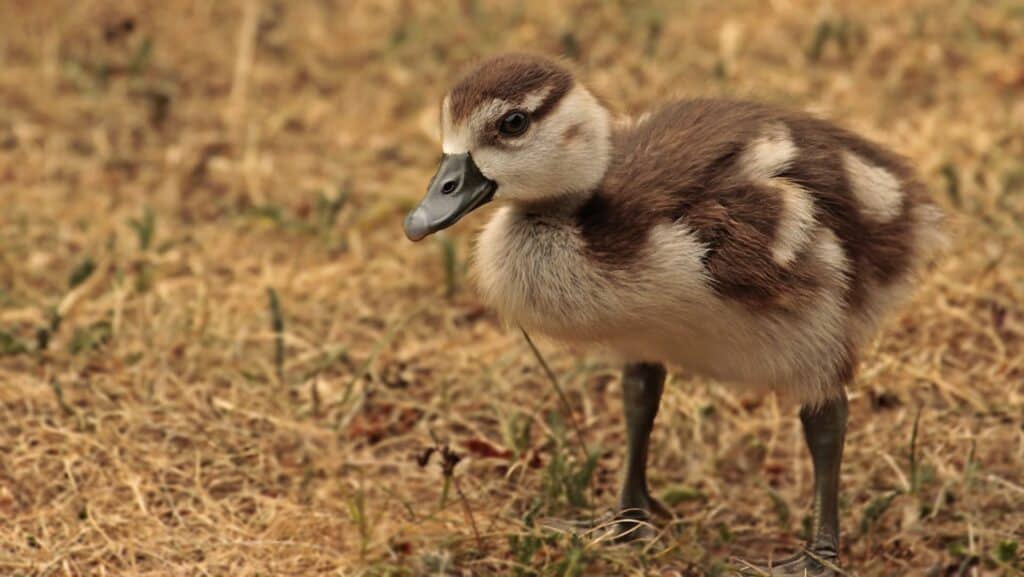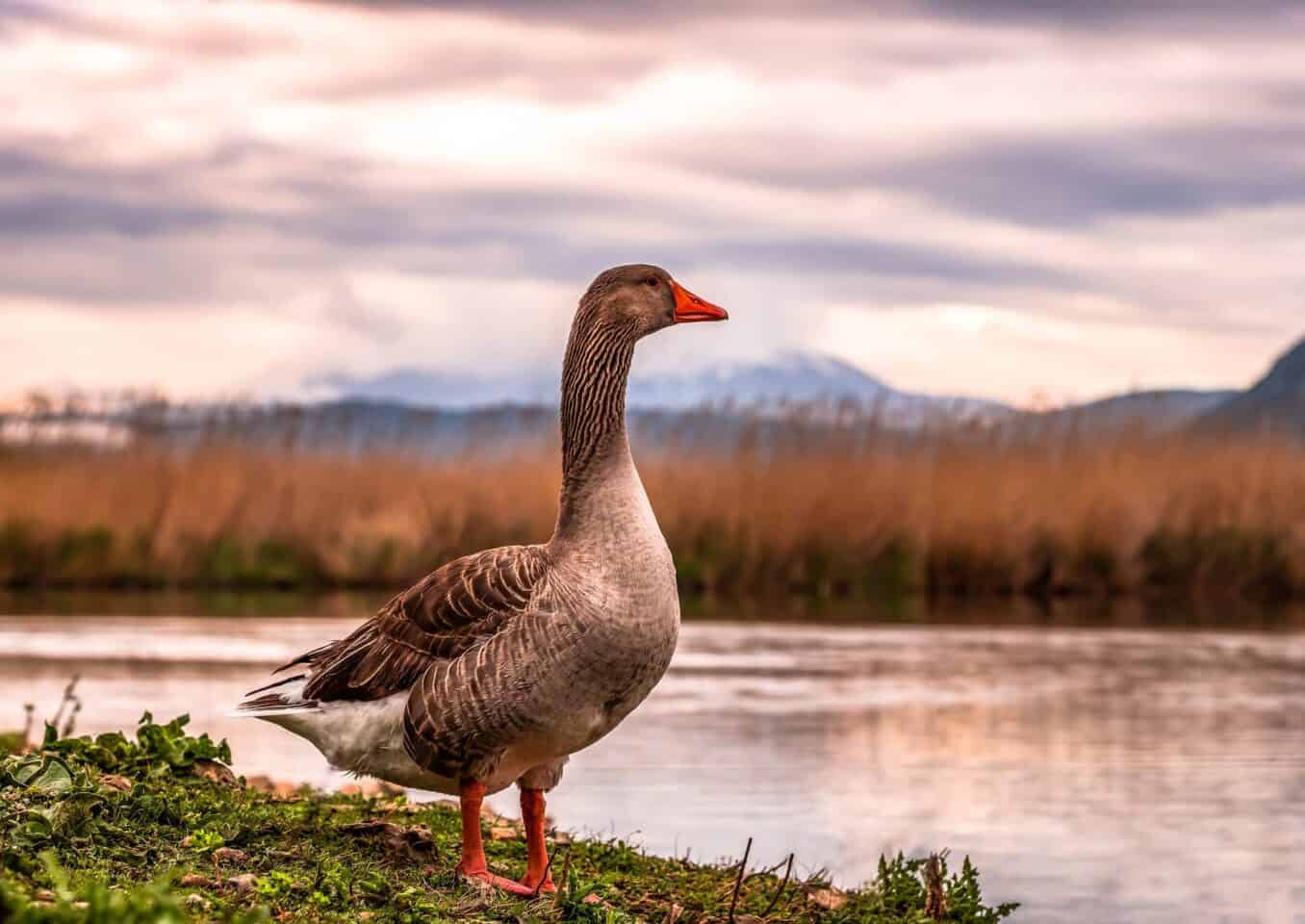Geese are big birds that spend most of their time near rivers and lakes, making them waterfowl. There are over two dozen species of geese in the world, with most of them feasting on things like:
- Grass
- Seeds
- Herbs
- Moss
- Grain
- Insects
- Mollusks
- Crustaceans
If geese could decide, they’d mainly feed on good quality grass—if there were enough of it to go around. Grass contains all the nutrients geese need, but it’s only nutritious when it’s fresh in the spring.
For geese to be able to consume grass, it has to be short or about 3 inches in length, otherwise, the grass is impossible for the geese to get ahold of and eat. This means you’d have to mow at home if you want to keep domestic geese. Alternatively, you could keep geese with some larger animals like cows or goats that could graze the longer grass so the geese could consume it.
When wild geese can’t find the grass they want to eat, they’ll fly to find fields, rivers, and lakes to forage for the other foods they consume. Geese enjoy eating a variety of aquatic plants and they pull submerged roots and rhizomes from the silt to eat. While geese do eat insects, crustaceans, and mollusks, these animals don’t make up much of their diet.

What Geese Need Nutritionally
Just like us and other animals, geese have specific nutritional needs. In many ways, geese require a diet similar to ducks, but with a few differences. For geese to be healthy and happy, these birds require the following:
- Amino acids
- Grains
- Greens
- Insoluble grit
- Niacin
- Calcium
- Vitamin A
- Vitamin D
What to Feed Geese at Your Local Lake or Pond
Unfortunately, many people who visit their local lakes and ponds to feed geese, give these waterfowl the wrong food like plain bread. Even though geese like to eat bread, it’s a food that doesn’t offer these birds any nutritional value.
Even if geese fill up on bread, a steady diet of bread will be harmful to these birds and they’ll become malnourished. When geese are used to being fed bread, more and more of them will arrive for the free handouts until the pond or lake can’t support their numbers, making very little natural food available for the birds.
Wild geese that are fed bread will also result in the adult geese neglecting to teach their young to forage for food. This will result in the young birds growing up completely reliant on humans to feed them.
If you plan on feeding wild geese, give them foods with some nutritional value like canned or frozen sweet corn or peas. You can also feed geese things like lettuce, cauliflower leaves, and cabbage. Great food to feed geese is commercially available waterfowl feed that’s a wheat or corn mix.

What Not to Feed Geese
Even if you’re tempted to take a bag of stale chips to the lake to feed the geese, don’t do it. Chips are just as bad as bread for geese as they don’t offer the birds any nutritional value. There are other things you should never feed to geese including:
- Cookies
- Popcorn
- Crackers
- Dry cereal
- Candy
The Role Geese Play in the Ecosystem
Even though some people don’t appreciate geese like many farmers that consider them pests, geese play an important role in the ecosystem.
In fact, geese provide several ecological benefits that help other animals and plants.
When geese eat in a field of grass and fly away, they act as seed dispersers by depositing seeds in other areas when defecating. The feces of geese also helps fertilize the soil by adding nutrients.
As part of the food chain, adult geese, their young, and eggs provide important food for other animals. Some animals that eat geese and their eggs include:
- Foxes
- Skunks
- Snakes
- Raccoons
- Turtles

Keeping Geese as Pets
Many people keep geese as pets. While not all geese are friendly toward people, some breeds like the Embden Goose and the Chinese Goose are friendly and docile, making them excellent pets. Caring for a backyard flock of geese can be both a unique and rewarding experience.
It’s inexpensive to care for and feed geese and they require minimal shelter. Since their favorite food is grass, you can build them a simple secure enclosure in a specific area of the yard. The geese can then feed on the grass and other plants living there, mowing and fertilizing your lawn as they nourish themselves!
If you want to raise geese for eggs, you should know that you won’t get eggs from them year-round like with chickens. This is because geese are seasonal layers that produce only 30-50 eggs each year, depending on the breed. But goose eggs are bigger than chicken eggs and they’re just as delicious and nutritious!
- Related Read: Do Geese Make Good Pets?
 Final Thoughts
Final Thoughts
Although geese sometimes get a bad rap for being aggressive and destructive to farmland, these waterfowl are an important part of nature. While geese have a varied diet, they prefer spending most of their time eating grass.
Featured Image Credit by Pixabay
